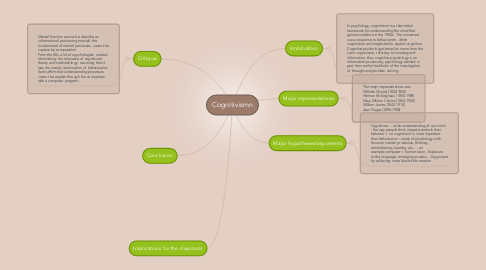Cognitivismn
by Millie Marguerithe

1. Critique
1.1. Mental function cannot be describe as informational processing models; the fundamental of mental processes cannot be capture by computation. From the 80s a lot of spychologists started diminishing the relevance of cognitivism theory and methodology assuming that it was the merely continuation of behaviourist. Sarle affirm that understanding processes cannot be explain through the comparison with a computer program .
2. Implications for the classroom
3. Conclusion
4. Introduktion
4.1. In psychology, cognitivism is a theoretical framework for understanding the mind that gained credence in the 1950s. The movement was a response to behaviorism, which cognitivists said neglected to explain cognition. Cognitive psychology derived its name from the Latin cognoscere, referring to knowing and information, thus cognitive psychology is an information-processing psychology derived in part from earlier traditions of the investigation of thought and problem solving.
5. Major representatives
5.1. The major representatives are: Wilhelm Wundt (1832-1920) Herman Ebbinghaus (1850-1909) Mary Whiton Calvins (1863-1930) William James (1842-1910) Jean Piaget (1896-1980)
6. Major hypotheses/arguments
6.1. Cognitivsm: - is the understanding of our mind - the way people think impacts/controls their behavior = so cognitivsm is more important than behaviorism - study of psychology with focus on mental processes, thinking, remembering, learning etc... - an example-computer = human brain - Exposure to the language, emerging process, - big picture by collecting more blocks/information


